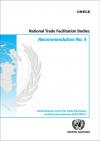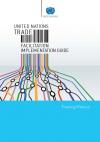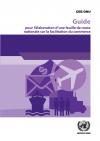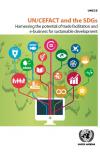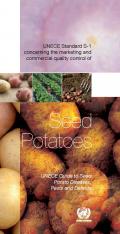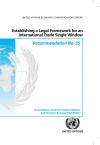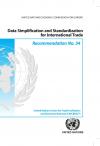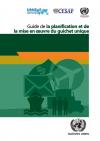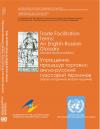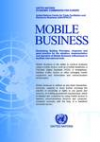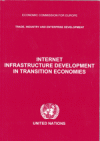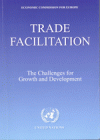Publications
Displaying Results 61 - 80 of 134
- English
This Recommendation, first published in 1974, has been revised in light of the changing context for Trade Facilitation and the adoption of the Trade Facilitation Agreement of the World Trade Organization. The revised Recommendation suggests that governments establish national trade facilitation bodies (NTFB) as an indispensable component of trade policy formation
- English
Trade facilitation creates a reliable, fast and cost-effective trade environment that benefits all countries and businesses, especially small and medium-sized enterprises (SMEs). It’s a collaborative effort by governments and traders to cut the costs of doing trade, reduce delays at borders, and make public agencies dealing with trade more efficient.Multiple
- English
In recent years, trade facilitation (TF) has been recognised as a key factor in trade and economic development policy. This is due to the realisation that trade facilitation can generate major benefits for the economy in terms of competitiveness and efficiency and can greatly enhance the participation of developing and transition economies in the global economy.
- English
The activities carried out by UN/CEFACT have very significant effects on the world we live in. They not only have specific impacts related to trade and e-business cutting across a broad range of domains, they also play a significant role in efforts to achieve even the most overarching goals such as poverty eradication and the reduction of inequality within and between
- Pусский
Сертификация семенного картофеля представляет собой процесс обеспечения качества семенного картофеля, реализуемого на рынке. Обычно сертификация проводится на национальном уровне согласно установленным стандартам. Посадка здорового семенного картофеля является одним из ключевых факторов увеличения производства пригодного для потребления и переработки картофеля.
В стандарте Европейской
- Français
La certification des plants de pomme de terre est l’aboutissement d’un processus de contrôle visant à garantir la qualité des plants commercialisés; elle est en principe réalisée selon des normes règlementaires nationales. Utiliser des plants sains est un facteur déterminant pour porter à son maximum la production de pommes de terre susceptibles d’être consommées ou transformées.
La norme pour
- English
Seed potato certification is the process of assuring the quality of seed potatoes being marketed, usually done nationally according to regulated standards. Planting healthy seed potatoes is a key factor in maximizing the production of usable potatoes for consumption or processing.
The United Nations Economic Commission for Europe (UNECE) Standard for Seed Potatoes sets out a common terminology
- English
UN/CEFACT Recommendation 35: Establishing a Legal Framework for an International Trade Single Window The publication (ECE/TRADE/401) of Recommendation 35 adds to the suite of products offered by UNECE to assist with the establishment of a Single Window. There
- English
UN/CEFACT Recommendation 34: Data Simplification and Standardization for International TradeRecommendation Number 34 (ECE/TRADE/400) was developed in response to a particular set of requests from Single Window implementers who were faced with the task of harmonizing and standardizing government information
- English
Commercial quality standards for agricultural produce are developed and approved by the United Nations Economic Commission for Europe through its Working Party on Agricultural Quality Standards. These international standards facilitate trade, encourage high-quality production, improve profitability and protect consumer interests. They are used by governments, producers, traders, importers and
- English
...The Single Window Planning and Implementation Guide contains managerial guidelines for policy managers, policymakers and those who are tasked to plan and manage the information technology-enabled Single Window development projects for simplifying cross-border trade procedures and document requirements within
- English
Commercial quality standards for agricultural produce are developed and approved by the United Nations Economic Commission for Europe through its Working Party on Agricultural Quality Standards. These international standards facilitate trade, encourage high-quality production, improve profitability and protect consumer interests. They are used by governments, producers, traders, importers and
- English
in cooperation with the Chamber of Commerce and Industry of the Russian FederationDownload as .pdf Symbol No. ECE/TRADE/377/Rev.1 Sales # B.12.II.E.12 ISBN 978-92-1-117055-9 eISBN 978-92-1-055244-8more
- English
Developing Guiding Principles, measures and good practice for the adoption, implementation and operation of Mobile Business (mBusiness) to facilitate international trade.The description of mBusiness in this publication is an attempt to help create a general understanding of the term and its components. It is not an attempt to provide a definitive definition. Work on m-Business is also
- English
Symbol No. ECE/TRADE/255 more details: [email protected]
- English
ECE/TRADE/316/Rev.1
- English
Symbol No. ECE/TRADE/299 Sales # E.03.II.E.10 ISBN 92-1-116824-4 – US$ 30 more details: [email protected]
- English
A brochure providing an introduction to the activities of the Working Party on Regulatory Cooperation and Standardization Policies (WP.6)To Download English,
- English
Draft UN/CEFACT procedure for ODP and directory announcementson the UN/CEACT Website.Version 0.4Download Draft
- English
Commercial quality standards for agricultural produce are developed and approved by the United Nations Economic Commission for Europe through its Working Party on Agricultural Quality Standards. These international standards facilitate trade, encourage high-quality production, improve profitability and protect consumer interests. They are used by governments, producers, traders, importers


